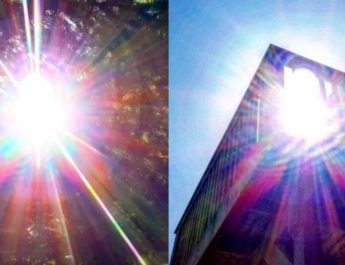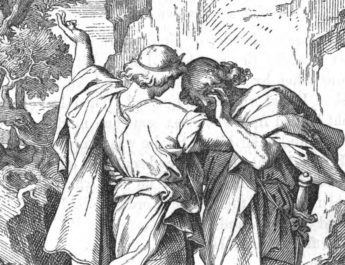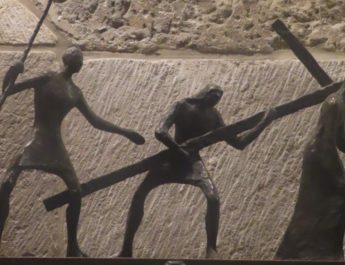Psalm 144
Of David.I
1 Blessed beII the Lord,III my rock,IV
I “David” = David. From the same as dod (beloved, love, uncle); the root may mean to boil, which is used figuratively to describe love. So, this implies someone you love such as a friend, a lover, or a close family member like an uncle. David’s name likely means something like “beloved one.”
II “blessed be” = barak. This is to kneel, to bless. It is blessing God as part of worship and adoration or blessing humans to help them. It can be used as a euphemism to say curse God.
III “Lord” = YHVH. From havah (to be, become) or hayah (to come to pass, become, be). This is the name of the God of Israel, the self-existent and eternal one, the tetragrammaton. This pronunciation has been lost to time so “Lord” is generally used in its place.
IV “rock” = tsur. From tsur (to confine, cramp, or bind in a literal or figurative sense; to besiege, assault, or distress). This is rock, stone, cliff, boulder, rocky. It can also be a refuge, a way to refer to God.
who trainsV my handsVI for warVII and my fingersVIII for battle,IX
V “trains” = lamad. Properly, this refers to goading (using a pointed stick to guide or prod one’s flock). By implication, it means teaching or instructing.
VI “hands” = yad. This is hand, ability, power. Hand in a literal sense, but also what one can do or the means by which one does it.
VII “war” = qerab. 9x in OT. From qarab (to come near, approach). This is a battle or other violent encounter.
VIII “fingers” = etsba. Perhaps from the same as tseba (dye, something dipped). This is finger or toe – something used to seize.
IX “battle” = milchamah. From lacham (to eat or feed on; figuratively, to battle as a kind of consumption/destruction). This is battle, war, fighting, or one who fights (i.e. a warrior).
2 my rockX and my fortress,XI
my strongholdXII and my deliverer,XIII
X “rock” = chesed. From chasad (being good, kind, merciful; may mean bowing one’s neck as is done in the presence of an equal for courtesy’s sake; so, if one in a superior position is treating you like an equal, that is what is captured here). This is favor, goodness, kindness, loving kindness, pity, reproach, or a good deed. When done by God to humanity, this is mercy/loving kindness. When done by humanity to God, it is piety.
XI “fortress” = matsud. From matsod (bulwark, siege works, net, snare); from tsud (to hunt, to lie in wait in order to catch an animal; used figuratively for capturing people). This is a castle, fortress, or stronghold. Also, a snare, net, or prey. It can abstractly mean capture.
XII “stronghold” = misgab. 17x in OT. From sagab (raise, lifted, high, secure on high, excellent, strong; literal and figurative). This is a high or inaccessible location. Abstractly, it can be altitude. Concretely it is a cliff or height. Figuratively, it is a refuge or stronghold – a high fort or tower. There is also a place called Misgab in Moab.
XIII “deliverer” = palat. This is to escape, slip out, deliver, carry away, or calve.
my shield,XIV in whom I take refuge,XV
who subduesXVI the peoplesXVII underXVIII me.
XIV “shield” = magen. From ganan (to surround, cover, defend, protect). This is a shield, defense, or figuratively a protector. It can also be used for a crocodile’s hide.
XV “take refuge” = chasah. This is to take refuge or flee for protection. Figuratively, it means to hope or trust in someone or something.
XVI “subdues” = radad. 4x in OT. This is to beat down in pieces, spread, subdue. Figuratively, this could be to conquer or it could be to cover something with gold (i.e. overlay).
XVII “peoples” = am. From amam (to darken, hide, associate; creating shadows by huddling together). This is people or nation. It can be used specifically for a tribe, collectively of troops or armies, or figuratively to refer to a flock of animals.
XVIII “under” = tachat. This is underneath, below, the bottom, instead of.
3 O Lord, what are humansXIX that you regardXX them,
or mortalsXXI that you thinkXXII of them?
XIX “humans” = adam. Perhaps from adam (to be red, make ruddy); related to adamah (ground, dirt, earth). This is man, humankind, also Adam’s name. It refers to a human individual or humanity.
XX “regard” = yada. This is to know, acknowledge, advise, answer, be aware, be acquainted with. Properly, this is to figure something out by seeing. It includes ideas of observation, recognition, and care about something. It can be used causatively for instruction, designation, and punishment.
XXI “mortals” = ben + ish. Literally, “child of humankind.” Ben is from banah (to build or obtain children). This is son, age, child. It is son in a literal or figurative sense. Ish is perhaps from enosh (human, humankind, mortal); from anash (to be weak, sick, or frail). This is man, husband, another, or humankind.
XXII “think” = chashab. This is properly to braid or interpenetrate. Literally it is to create or to wear. Figuratively, it can mean plotting – generally in a negative sense. More broadly, this can also mean think, consider, or make account of.
4 TheyXXIII are likeXXIV a breath;XXV
their daysXXVI are like a passingXXVII shadow.XXVIII
XXIII “they” = adam. Same as “humans” in v3. See note XIX above.
XXIV “are like” = damah. This is to be like, resemble, devise. It can be to think using analogies.
XXV “breath” = hebel. This is emptiness, vapor, breath. It can refer to something that is fleeting or futile, worthless or a delusion. Something that is passing and so does not satisfy. This is related to the root for the name “Abel.”
XXVI “days” = yom. Root may mean being hot. This is the day in a literal or figurative sense. It can also mean birth, age, daylight, continually or other references to time.
XXVII “passing” = abar. This is to pass over or cross over. It is used for transitions, whether literal or figurative. It can also mean to escape, alienate, or fail. This is the root verb from which “Hebrew” is drawn.
XXVIII “shadow” = tsel. From tsalal (to be or become dark, shade; this is the shade as during twilight or shadow as associated with something opaque). This is shade in a literal or figurative sense. So, it could be shadow, shade, protection, shelter, or defense.
5 BowXXIX your heavens,XXX O Lord, and come down;XXXI
touchXXXII the mountainsXXXIII so that they smoke.XXXIV
XXIX “bow” = natah. This is to stretch or spread out, to extend, or bend. In can also imply moral deflection.
XXX “heavens” = shamayim. Root may mean being lofty. This is sky, the air, or heaven. It is in a dual noun form so this might refer to the part of the sky where the clouds move on the one hand and the part beyond that where the sun, moon, and stars are on the other hand.
XXXI “come down” = yarad. This is to go down, descend; going down in a literal or figurative sense. It can be going to the shore or a boundary, bringing down an enemy.
XXXII “touch” = naga. This is touch, reach, arrive, come near, strike. This is touching for any reason including sexual or violent.
XXXIII “mountains” = har. From harar (hill or mountain). This is mountain, hill, hilly region.
XXXIV “smoke” = ashan. 6x in OT. From ashan (smoke, vapor, dust, or anger). This is to smoke or burn in a literal or figurative sense; to be angry.
6 Make the lightningXXXV flashXXXVI and scatterXXXVII them;
send outXXXVIII your arrowsXXXIX and routXL them.
XXXV “lightning” = baraq. Related to “flash” in v6. From baraq (see note XXXVI below). This is lightning. Figuratively, it could be a gleaming or glittering. Concretely, it could be a flashing sword.
XXXVI “flash” = baraq. 1x in OT. This is to flash, a flash of lightning.
XXXVII “scatter” = puts. This is to dash in pieces, scatter, disperse, drive.
XXXVIII “send out” = shalach. This is to send out, away, send for, forsake. It can also mean to divorce or set a slave free.
XXXIX “arrows” = chets. From chatsats (to divide, chop, pierce, distribute, shoot an arrow, an archer). This is an arrow or archer, shaft, staff. Properly, it is someone or something that pierces, such as an arrow. It can imply a wound. Used figuratively of God’s thunder bolt.
XL “rout” = hamam. 14x in OT. This is being noisy, confused, thrown into confusion, trouble, cause a commotion, disturb, rout, damage, destroy.
7 Stretch outXLI your hand from on high;XLII
set me freeXLIII and rescueXLIV me from the mightyXLV waters,XLVI
from the hand of foreigners,XLVII
XLI “stretch out” = shalach. Same as “send out” in v6. See note XXXVIII above.
XLII “on high” = marom. From rum (to be high, rise, exalted, become proud, display, offer, present, set apart, extol; to rise in a literal or figurative sense). This can be height, high place, or lofty. It can be either exalted or haughty/proud. It can refer to dignity or to heaven.
XLIII “set…free” = patsah. 15x in OT. This is to open, part, rend. It often refers to the mouth.
XLIV “rescue” = natsal. This is to snatch someone or something away in a good sense – as rescue, defend, or deliver – or in a bad sense – as strip or plunder.
XLV “mighty” = rab. From rabab (increasing in any aspect whether quantity, authority, size, quality, greatness, etc.). This is abundance, many, elder, exceedingly, great. It refers to abundance of amount, rank, or status.
XLVI “waters” = mayim. This is water, waters, or waterway in a general sense. Figuratively, it can also mean juice, urine, or semen.
XLVII “foreigners” = ben + nekar. Literally, “children of foreigners.” Ben is the same as “mortals” in v3. See note XXI above. Nekar is from the same as neker (misfortune, disaster). This is foreign or something that is foreign i.e. strange.
8 whose mouthsXLVIII speakXLIX liesL
and whose right handsLI are false.LII
XLVIII “mouths” = peh. This is mouth in a literal or figurative sense. So, more literally, it can be beak or jaws. More figuratively, it refers to speech, commands, or promises.
XLIX “speak” = dabar. This is generally to speak, answer, declare, or command. It might mean to arrange and so to speak in a figurative sense as arranging words.
L “lies” = shav. Perhaps from the same as sho (ruin, desolation, storm; from a root that means rushing over – hence a storm and hence devastation). This is emptiness, false, worthless, deceit. It can also refer to evil, guile, idolatry, or something being in vain.
LI “right hands” = yamin + yamin. Literally, “their right hand of a right hand.” May be from yamam (to go or choose the right, use the right hand; to be physically fit or firm). This can mean right hand, right side, or south. Since most people are right-handed, the metaphorical usage of this word presumes that the right hand is stronger and more agile. Thus, it is the instrument of power and action.
LII “false” = sheqer. This is deception, lie, or disappointment. It can also be something that is vain or wrongfully.
9 I will singLIII a newLIV songLV to you, O God;LVI
upon a tenLVII-stringed harpLVIII I will playLIX to you,
LIII “sing” = shir. Related to “song” in v9. See note LV below.
LIV “new” = chadash. From chadash (to renew or restore, to repair or rebuild). This is something fresh or new.
LV “song” = shir. From shir (to sing; one who is singing or leading others in song). This is song or singer.
LVI “God” = Elohim.
LVII “ten” = asor. 16x in OT. From the same as eser (teen or -teen). This is ten or tenth. Here, a ten-stringed instrument like the lute.
LVIII “harp” = nebel. From nabel (to fall away, faint, wither, languish, sink; figuratively, being senseless, foolish, or wicked; to despise, disgrace, or fall to nothing, to be seen with contempt). This is a vessel, perhaps made of skins for holding liquids. It could be a skin, vase, or lyre as having a similar shape.
LIX “play” = zamar. Perhaps from zamar (to trim or prune). This is making music. It is used specially of music to worship God. So, music with singing, singing praise, or singing psalms.
10 the one who givesLX victoryLXI to kings,LXII
who rescuesLXIII his servantLXIV David.
LX “gives” = natan. This is to give, put, set, offer. It is to give literally or figuratively.
LXI “victory” = teshuah. From yasha (to deliver, defend, help, preserve, rescue; properly, to be open, wide or free, which implies being safe; to free someone). This is deliverance or salvation.
LXII “kings” = melek. From malak (to be or become king or queen, to rise to the throne, to be crowned; by implication, to take counsel). This is king or royal.
LXIII “rescues” = patsah. Same as “set…free” in v7. See note XLIII above.
LXIV “servant” = ebed. From abad (to work, serve, compel; any kind of work; used causatively, can mean to enslave or keep in bondage). This is a servant, slave, or bondservant.
11 RescueLXV me from the cruelLXVI sword,LXVII
and deliverLXVIII me from the hand of aliens,LXIX
whose mouths speak lies,
and whose right hands are false.
LXV “rescue” = patsah. Same as “set…free” in v7. See note XLIII above.
LXVI “cruel” = ra’. From ra’a’ (to be evil, bad, afflict; properly, to spoil – to destroy by breaking into pieces; figuratively, to cause something to be worthless; this is bad in a physical, social, or moral sense; that which displeases, to do harm or mischief, to punish or vex). This is bad, disagreeable, that which causes pain, misery, something having little or no value, something that is ethically bad, wicked, injury, calamity. This refers to anything that is not what it ought to be – a natural disaster, a disfigurement, an injury, a sin.
LXVII “sword” = chereb. From charab (to attack, slay). This is any sharp instrument like a sword, dagger, axe, or mattock.
LXVIII “deliver” = natsal. Same as “rescue” in v7. See note XLIV above.
LXIX “aliens” = ben + nekar. Literally, “children of foreigners.” Same as “foreigners” in v7. See note XLVII above.
12 May our sonsLXX in their youthLXXI
be like plantsLXXII full grown,LXXIII
LXX “sons” = ben. Same as “mortals” in v3. See note XXI above.
LXXI “youth” = naur. From naar (child or a servant; a child in their active years so they could be aged anywhere from infancy to adolescence); perhaps from naar (to shake, toss up and down, tumble around). This is youth or childhood.
LXXII “plants” = natia. 1x in OT. From nata (to fix or fasten, establish or plant; planting in a literal or figurative sense). This is a plant.
LXXIII “full grown” = gadal. This is to grow up, become great, become wealthy – to advance. The root meaning may be to twist in the sense of the process of growing.
our daughtersLXXIV like corner pillars,LXXV
cutLXXVI for the buildingLXXVII of a palace.LXXVIII
LXXIV “daughters” = bat. Related to “mortals” in v3. From ben (see note XXI above). This is daughter in a literal or figurative sense.
LXXV “corner pillars” = zavith. 2x in OT. May come from a word that means to be prominent. This is a corner, angle, corner column.
LXXVI “cut” = chatab. 9x in OT. This is to chop wood, a woodcutter, to polish or carve wood.
LXXVII “building” = tabnith. Related to “mortals” in v3 & “daughters” in v12. From banah (see note XXI above). This is a structure, model, figure, image, or resemblance.
LXXVIII “palace” = hekal. Perhaps from yakol (to be able, endure, overcome, prevail). This is a large building with public access such as a palace or temple.
13 May our barnsLXXIX be filledLXXX
with produce of every kind;LXXXI
may our sheepLXXXII increase by thousands,LXXXIII
by tens of thousandsLXXXIV in our fields,LXXXV
LXXIX “barns” = mazu. 1x in OT. May come from a word that means to gather in. This is a barn or granary.
LXXX “be filled” = male + puq. Male is fill, satisfy, replenish, accomplish, fulfill, confirm, or consecrate. It is fill in a literal or figurative sense. Puq is 7x in OT. This is to supply, obtain, offer, give, secure, succeed.
LXXXI “produce of every kind” = zan + el + zan. Literally, “from kind to kind.” Zan is 3x in OT. Perhaps from zun (to feed, be plump). This is a kind or sort. It can also refer to something that is fully developed.
LXXXII “sheep” = tson. This is a flock of sheep and goats.
LXXXIII “increase by thousands” = alaph. 1x in OT. From eleph (thousan); from the same as eleph (herd, cattle); from alaph (to learn, speak, associate with). This is to increase by thousands, bring forth.
LXXXIV “tens of thousands” = rabab. Related to “mighty” in v7. 13x in OT. See note XLV above.
LXXXV “fields” = chuts. Root may mean to sever. So, this is something that is separated by a wall – the outside, the street, a field, highway, or abroad.
14 and may our cattleLXXXVI be heavy with young.LXXXVII
May there be no breachLXXXVIII in the walls, no exile,LXXXIX
and no cry of distressXC in our streets.XCI
15 HappyXCII are the people to whom such blessings fall;
happy are the people whose God is the Lord.
LXXXVI “cattle” = alluph. Related to “increase by thousands” in v13. From alaph (see note LXXXIII above). This is a friend, something gentle like a tame bull. It can also refer to someone who is noble or a leader like a captain, guide, or governor.
LXXXVII “be heavy with young” = sabal. 9x in OT. This is carry a heavy load, do strong labor, be a burden. Can also specially mean to be pregnant.
LXXXVIII “breach” = perets. 19x in OT. From parats (to make a breach, burst out, compel, disperse; to break out literally or figuratively). This is a breach or a gap. It could be a break, whether literal or figurative.
LXXXIX “exile” = yatsa. This is to go or come out, bring forth, appear. It is to go out in a literal or figurative sense.
XC “cry of distress” = tsevachah. 4x in OT. From tsavach (to cry out, shout for joy). This is a cry of distress, outcry, cry of anguish.
XCI “streets” = rechob. From rachab (to grow wide or enlarge in a literal or figurative sense; extend, relieve, rejoice, or speak boldly). This is a wide, open place like a plaza, square, or avenue.
XCII “happy” = esher. From ashar (to go straight, lead, guide; to be level and so to be right, blessed, honest, happy). This is happy or blessedness.
Image credit: “Nature’s Shadow Play” by Farrukh, 2007.




